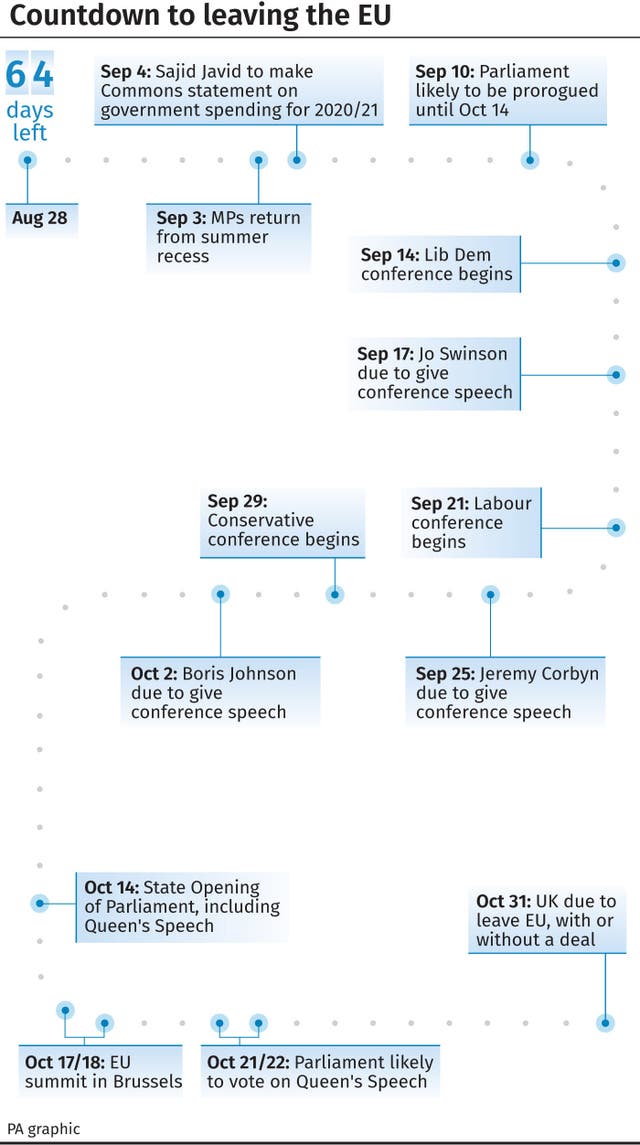Is Queen’s Speech plan legit or has Boris gone prorogue?
The Prime Minister insists he just wants to set out his ‘exciting agenda’.

The Queen has approved an order to prorogue Parliament, which will effectively suspend it for a month.
Prime Minister Boris Johnson said his move to prorogue Parliament was simply to set out his “exciting agenda” in a Queen’s Speech on October 14.
But critics, including Commons Speaker John Bercow, have lambasted the move, calling it a “constitutional outrage” designed to stop MPs from intervening as the UK heads towards a no-deal Brexit on October 31.
Here are some of the key questions and answers triggered by Wednesday’s move:
– What does prorogation mean?
Prorogation marks the end of a parliamentary session. The current session, which started on June 21, 2017 with the last State Opening and Queen’s Speech, has been the longest in history.
– Who does it?
The Queen formally prorogues Parliament following guidance from the Privy Council, which is her body of advisers made up mainly of senior politicians.

– Why does Boris Johnson want to prorogue Parliament now?
A new Government brings with it new plans and legislation which are set out in a Queen’s Speech. Mr Johnson insists he asked the Queen to end the current session of Parliament so he can start anew.
– What happens during prorogation?
While Parliament is prorogued, MPs and peers cannot formally debate policy and legislation or make any laws of their own.
Parliamentary scrutiny is suspended and the powers of the Houses of Commons and Lords are effectively taken away until the next Queen’s Speech.
– How long will Parliament be prorogued for?
Prorogation normally tends to be for a short amount of time – no longer than two weeks, with it leading to either a general election or the start of a new Parliamentary session.
Under the new plan, Parliament will be dissolved no earlier than September 9 and no later than September 12, until the Queen’s Speech on October 14.
Parliament had been due to break for its conference recess for at least two weeks in the lead up to October, even before the news of the prorogation broke, with Number 10 arguing that MPs are only losing an extra four sitting days in total.
Mr Johnson said there would still be “ample time” for MPs to debate Brexit in the second half of October.
– So why has the move sparked such anger?
There have been fears for a number of months that, should the Government not be able to strike an exit deal with the European Union, the Prime Minister could look to prorogue Parliament to prevent MPs from attempting to stop the UK leaving without a deal.
Critics believe this is what he is doing now. Senior opposition figures and Tory opponents of a no-deal Brexit met on Tuesday to draw up plans to stop the UK crashing out of the EU without an agreement. A day later the PM has effectively moved to curtail their time to draw-up legislation that would prevent Britain from exiting without a Withdrawal Agreement signed-off.
– So could a snap general election still be on the cards?
Commentators saw the surprise announcement that Chancellor Sajid Javid will set out Whitehall spending budgets next week as a sign that the new administration was ramping up plans for an early election.
But inviting the monarch to Parliament for the pomp and ceremony of the Queen’s Speech on October 14 would be an odd thing to do if the PM is actually planning a snap election.
However, if opposition and rebel Tory MPs unite behind a no-confidence motion against the Government in retaliation against the plans to prorogue, that could force Parliament into a stalemate where a general election is the only resolution.





